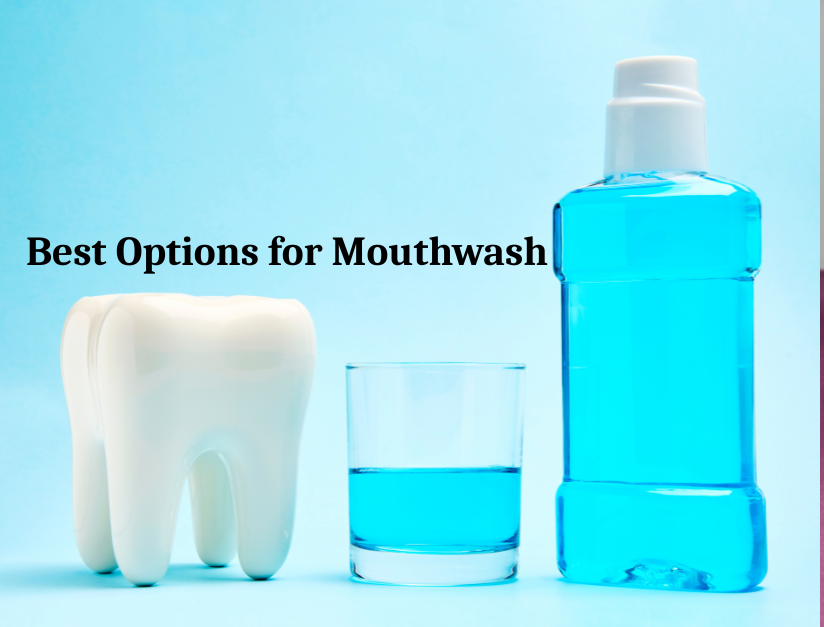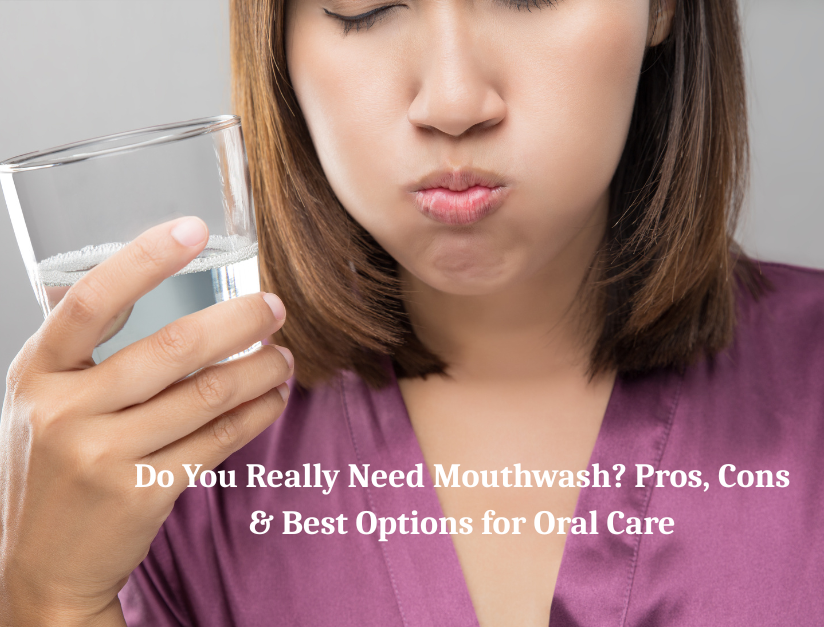Introduction
Walk down any pharmacy aisle, and you’ll see dozens of colorful bottles of mouthwash claiming to fight germs, freshen breath, and whiten teeth. But do you really need mouthwash as part of your daily routine? Or is it just a marketing trick? At Royal Oral & Dental Clinic, we believe in giving our patients clear, evidence-based answers. Let’s explore the benefits, drawbacks, and best options for mouthwash so you can make an informed decision about your oral health.
Benefits of Using Mouthwash
- Freshens Breath
Mouthwash can temporarily mask bad breath and leave your mouth feeling refreshed. - Reduces Bacteria
Antibacterial mouthwashes (with chlorhexidine or cetylpyridinium chloride) reduce harmful bacteria that cause gum disease. - Helps Prevent Cavities
Fluoride-based mouthwashes strengthen enamel and provide extra protection against tooth decay. - Soothes Oral Conditions
Special mouthwashes may help reduce gum inflammation, mouth ulcers, or dry mouth.
Drawbacks of Mouthwash
- Not a Substitute for Brushing & Flossing
Mouthwash cannot remove plaque. Brushing and flossing are still essential. - Alcohol-Based Mouthwash Side Effects
Some contain alcohol, which may cause dry mouth, burning sensation, or worsen sensitivity. - Temporary Results
Fresh breath effects usually last only a few hours. - Overuse Can Cause Staining
Some strong mouthwashes (especially chlorhexidine) may cause brown stains on teeth if used too often.

Best Options for Mouthwash
- For cavity prevention: Fluoride mouthwash (e.g., ACT Anticavity).
- For gum problems: Antibacterial mouthwash with chlorhexidine (only under dentist supervision).
- For dry mouth: Alcohol-free mouthwash with added moisturizers (like Biotène).
- For daily use: Alcohol-free, mild options that freshen breath without irritation.
Always choose mouthwash based on your oral health needs — not just flavor or color.
Do You Really Need Mouthwash?
For most people, mouthwash is optional. If you brush twice daily, floss regularly, and maintain good dental checkups, mouthwash is an extra — not a necessity. But if you struggle with bad breath, cavities, or gum problems, the right mouthwash (recommended by your dentist) can make a big difference.
Tips for Using Mouthwash Correctly
- Use after brushing and flossing, not as a replacement.
- Avoid eating or drinking for 30 minutes after rinsing.
- Don’t swallow mouthwash — it’s for rinsing only.
- Ask your dentist which type is best for you.
Conclusion
Mouthwash can be a helpful tool — but it’s not a magic solution. The foundation of healthy teeth and gums is still brushing, flossing, and regular dental checkups. At Royal Oral & Dental Clinic, Dr. Deepesh Gupta and his team guide patients on whether mouthwash is necessary based on their individual needs.
FAQs
Q1. Is mouthwash necessary for good oral health?
Mouthwash is not essential for everyone. Brushing and flossing are the foundation of oral care. Mouthwash can be helpful for fresh breath, cavity protection, or gum problems, but it should be seen as a supplement, not a substitute.
Q2. Which type of mouthwash is best?
The best mouthwash depends on your needs:
- Fluoride mouthwash – strengthens teeth and prevents cavities
- Antibacterial mouthwash – controls gum disease (use under dentist guidance)
- Alcohol-free mouthwash – gentler and better for dry mouth
Always consult your dentist before choosing.
Q3. Is it safe to use mouthwash every day?
Yes, daily use of a mild, alcohol-free mouthwash is generally safe. However, overusing strong antibacterial mouthwash can lead to tooth staining or imbalance in mouth bacteria.
Q4. Can mouthwash replace brushing and flossing?
No. Mouthwash cannot remove plaque or food debris. Brushing twice a day and flossing daily remain the most effective ways to keep teeth and gums healthy.
Q5. Does mouthwash really help with bad breath?
Yes, mouthwash can temporarily reduce bad breath by killing odor-causing bacteria. However, if bad breath persists, it may be a sign of gum disease, cavities, or other health issues that require dental attention.
Q6. Is alcohol-based mouthwash harmful?
Alcohol-based mouthwashes can cause dry mouth, irritation, or sensitivity. For most patients, alcohol-free mouthwash is a safer and more comfortable option.
Q7. When is the best time to use mouthwash?
Use mouthwash after brushing and flossing. Avoid rinsing with water right after, and wait at least 30 minutes before eating or drinking to allow the active ingredients to work effectively.
CTA
👉 Still unsure if mouthwash is right for you? Book a consultation with Dr. Deepesh Gupta at Royal Oral & Dental Clinic and get a personalized oral care plan.

